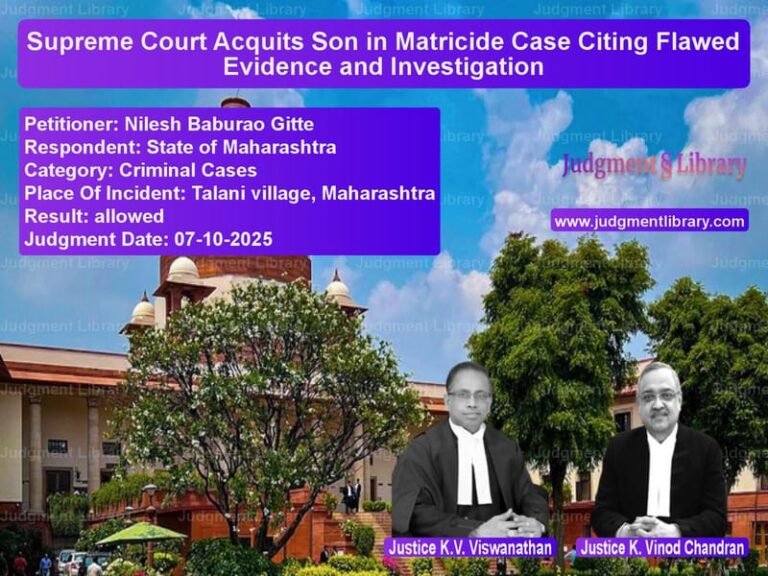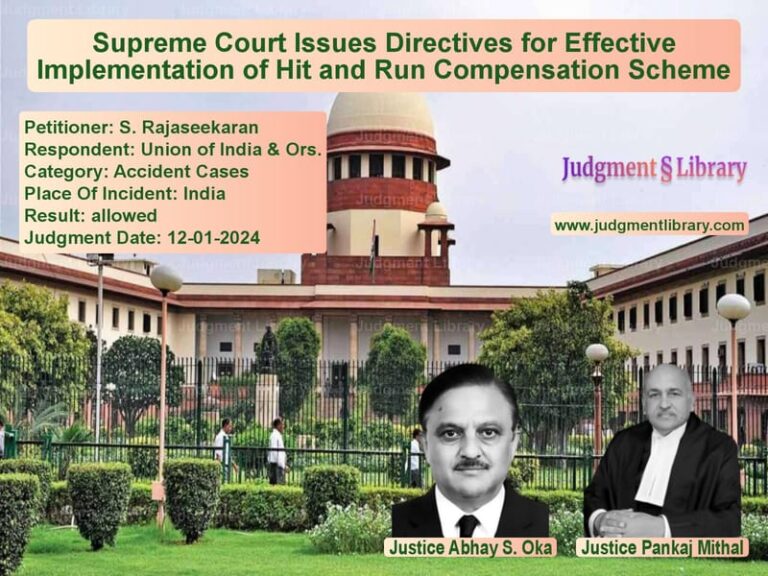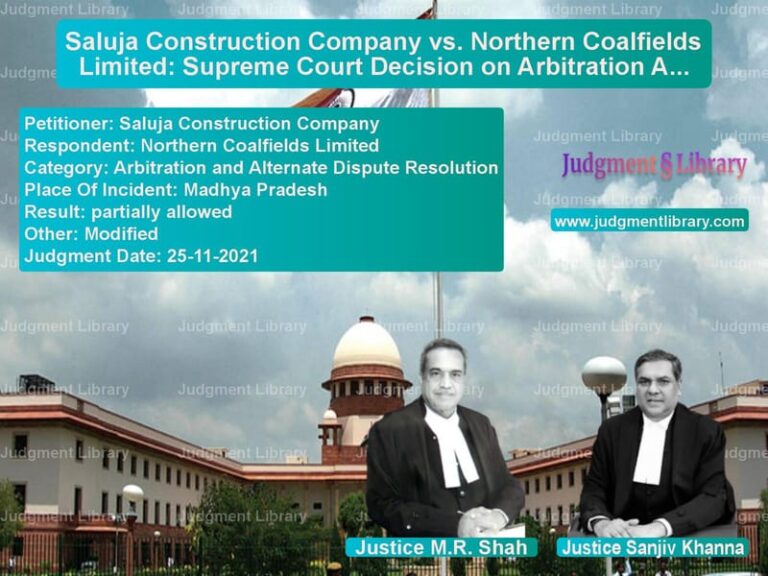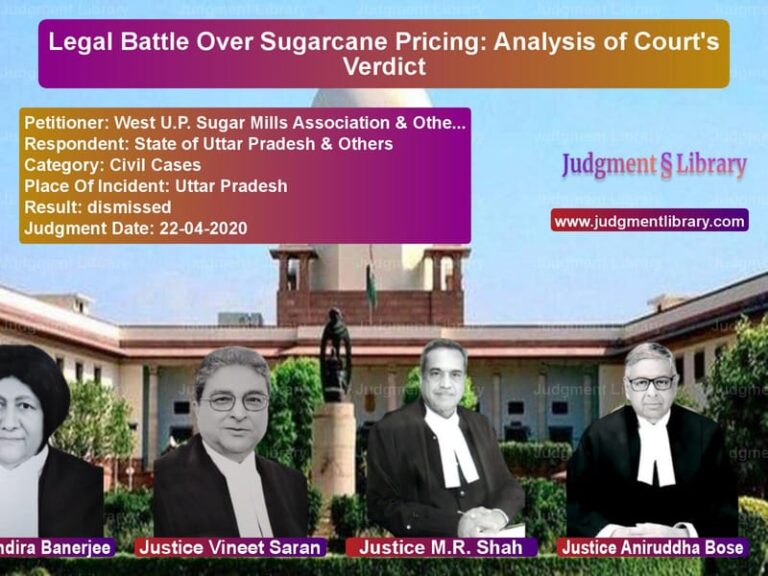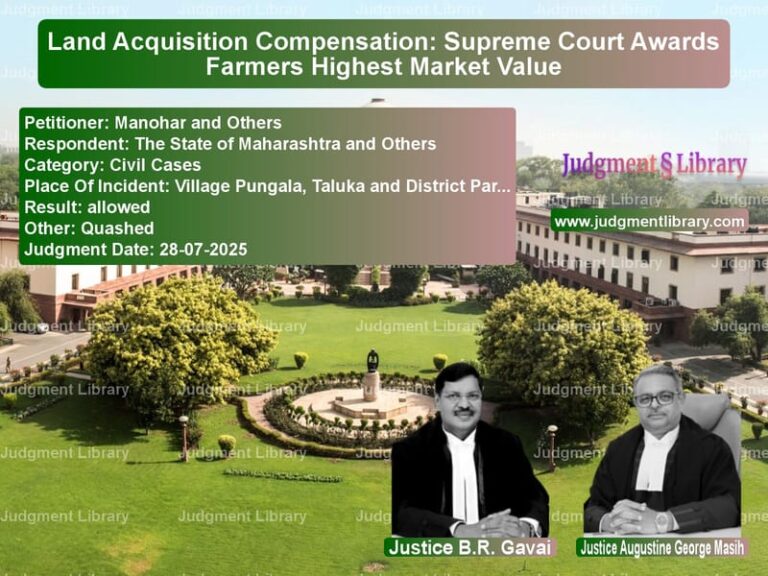Supreme Court Remands Land Fragmentation Case for Fresh Consideration
The case of Kanaiyalal Mafatlal Patel v. The State of Gujarat & Others concerns the validity of a sale transaction that was challenged under the Gujarat Prevention of Fragmentation and Consolidation of Holdings Act, 1947. The Supreme Court examined whether the sale in favor of the appellant violated the Act and whether due process was followed by the authorities in passing eviction orders against him.
Background of the Case
The dispute arose when the appellant purchased 2377.50 square meters of agricultural land in Village Ambapur, Taluka and District Gandhinagar, Gujarat. The land was part of a larger property originally owned by Shankarbhai Dungardas and later divided among his three sons and their legal heirs.
On September 29, 2006, the appellant entered into a sale agreement with legal heirs of two branches of the family, excluding the legal heirs of Prabhudasbhai. The transaction was formalized through a Registered Sale Deed on July 12, 2007, and the appellant took possession of the land. The mutation of records was carried out on July 25, 2007.
In March 2010, legal heirs of Prabhudasbhai (Respondent Nos. 6 to 9) challenged the transaction, alleging that it violated Section 31(1)(b) of the Gujarat Prevention of Fragmentation and Consolidation of Holdings Act, 1947. The Prant Officer, Gandhinagar, ruled against the appellant on May 17, 2012, holding the sale illegal and ordering his eviction.
Legal Issues Raised
- Was the sale transaction in violation of Section 31(1)(b) of the Gujarat Prevention of Fragmentation and Consolidation of Holdings Act, 1947?
- Did the authorities follow due process in ordering the eviction of the appellant?
- Did the land sold to the appellant constitute a ‘fragment’ under the Act?
- Was there a proper hearing before the authorities?
Arguments of the Appellant
The appellant contended:
- He purchased a legally partitioned portion of land, which was not a fragment as defined under the Act.
- The order of eviction was passed without giving him a proper opportunity to present his case.
- He was not properly served with notice of the proceedings before the Prant Officer.
- The decision to evict him was made without considering that similar sales by the other co-owners had been recognized.
Arguments of the Respondents
The State of Gujarat and the legal heirs of Prabhudasbhai (Respondent Nos. 6 to 9) argued:
- The sale violated Section 31(1)(b) of the Act as it involved subdivision of land without prior approval from the Collector.
- The land remained undivided as per revenue records, making the sale illegal.
- The mutation of records did not override the legal restrictions imposed by the Act.
- The appellant was aware of the legal proceedings but failed to challenge them in a timely manner.
Supreme Court’s Observations
1. Lack of Proper Hearing
The Supreme Court noted that the Prant Officer issued an eviction order without affording the appellant a fair hearing. The Court stated:
“The appellant was not given a full opportunity to present his case before the original authority or the revisional authority.”
2. Uncertainty Over Land Partition
The Court observed that while the High Court held there was no partition of the land, evidence suggested otherwise. The respondents themselves had entered into a sale agreement in 2014, recognizing the division of land.
3. Applicability of Fragmentation Laws
The Court found that the issue of whether the land in question was a ‘fragment’ was not thoroughly examined. Under Section 2(4) of the Act, a ‘fragment’ is defined based on standard landholding sizes.
4. Procedural Irregularities in Revenue Records
The Court found discrepancies in revenue records concerning the classification of land as irrigated or dry land. The records showed agricultural activity over decades, contradicting claims that it lacked irrigation.
Final Judgment
The Supreme Court ruled:
- The orders of the Gujarat High Court and lower authorities were set aside.
- The case was remanded to the Prant Officer, Gandhinagar, for fresh consideration.
- Both parties were directed to present documentary and oral evidence to determine whether the land was a ‘fragment’ under the Act.
- The Prant Officer was instructed to complete the proceedings within six months.
The Court concluded:
“Having purchased the land after parting with valuable consideration, the appellant cannot be condemned without being given a full opportunity to present his case.”
Key Takeaways
1. Due Process Must Be Followed in Land Disputes
Courts must ensure that parties receive proper hearings before decisions affecting their property rights are made.
2. Land Fragmentation Laws Must Be Carefully Interpreted
The classification of land as a ‘fragment’ must be supported by concrete evidence, including revenue records and agricultural history.
3. Procedural Lapses Can Lead to Case Remand
Authorities must strictly follow legal procedures to prevent unnecessary litigation.
4. Fair Opportunity for Both Parties
The ruling reinforces the principle that property rights must be adjudicated with full consideration of both parties’ claims.
Conclusion
The Supreme Court’s ruling ensures that the appellant is given a fair chance to defend his property rights. It highlights the necessity of procedural fairness in land disputes, particularly in cases involving fragmentation laws. The decision sets an important precedent for future land acquisition cases where due process is at stake.
Petitioner Name: Kanaiyalal Mafatlal Patel.Respondent Name: The State of Gujarat and others.Judgment By: Justice C.T. Ravikumar, Justice Sanjay Kumar.Place Of Incident: Gandhinagar, Gujarat.Judgment Date: 05-12-2023.
Don’t miss out on the full details! Download the complete judgment in PDF format below and gain valuable insights instantly!
Download Judgment: kanaiyalal-mafatlal-vs-the-state-of-gujarat-supreme-court-of-india-judgment-dated-05-12-2023.pdf
Directly Download Judgment: Directly download this Judgment
See all petitions in Property Disputes
See all petitions in Landlord-Tenant Disputes
See all petitions in Judgment by C.T. Ravikumar
See all petitions in Judgment by Sanjay Kumar
See all petitions in allowed
See all petitions in Remanded
See all petitions in supreme court of India judgments December 2023
See all petitions in 2023 judgments
See all posts in Civil Cases Category
See all allowed petitions in Civil Cases Category
See all Dismissed petitions in Civil Cases Category
See all partially allowed petitions in Civil Cases Category



